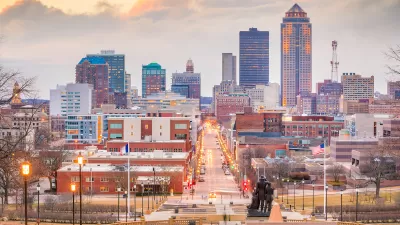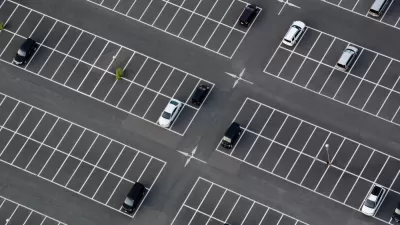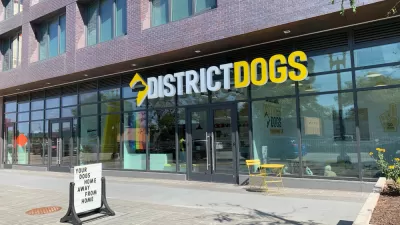In the wealthy community of Spring Valley, just inside the western boundaries of the District of Columbia, residents are opposing a proposed development by claiming the site—a parking lot—is a historic landmark.
Aaron Wiener begins his coverage of the parking lot as historic landmark by telling the story of its original development in 1942, as a pioneering suburban retail landmark. The site has changed hands, original developed as a Garfinckel's and some features of the neighborhood have also changed (the end of racial covenants, for instance), but developers are still interested in the site.
"Last fall, Miller sold the Spring Valley Shopping Center on Massachusetts Avenue NW, anchored by the Crate & Barrel that took over the old Garfinckel’s space, to the Washington Real Estate Investment Trust. WRIT, as it’s known, recently announced plans to erect a two-story building on a portion of the parking lot between Crate & Barrel and Capital One Bank, with ground-floor retail topped by offices or additional retail."
And here's the rub. Residents would rather keep the parking lot, and they're pulling the historic preservation card to make the case. The argument isn't that this particular parking lot has some unique design or environmental feature that makes it outstanding. Rather, "what some neighbors do claim is that because the parking lot was built at a time of car-focused retail development, it is an historic landmark," according to Wiener.
Weiner goes on to provide a lot more detail about the specific example of the Spring Valley case study, as well as the larger question about the nature of historic preservation it raises. For the record, the case for parking lots as a signature feature of American development history was made in detail by David Rotenstein on the National Council on Public History website in 2014.
FULL STORY: A Lot to Lose: Can a Parking Lot Be an Historic Landmark?

Alabama: Trump Terminates Settlements for Black Communities Harmed By Raw Sewage
Trump deemed the landmark civil rights agreement “illegal DEI and environmental justice policy.”

Study: Maui’s Plan to Convert Vacation Rentals to Long-Term Housing Could Cause Nearly $1 Billion Economic Loss
The plan would reduce visitor accommodation by 25% resulting in 1,900 jobs lost.

Planetizen Federal Action Tracker
A weekly monitor of how Trump’s orders and actions are impacting planners and planning in America.

Waymo Gets Permission to Map SF’s Market Street
If allowed to operate on the traffic-restricted street, Waymo’s autonomous taxis would have a leg up over ride-hailing competitors — and counter the city’s efforts to grow bike and pedestrian on the thoroughfare.

Parklet Symposium Highlights the Success of Shared Spaces
Parklets got a boost during the Covid-19 pandemic, when the concept was translated to outdoor dining programs that offered restaurants a lifeline during the shutdown.

Federal Homelessness Agency Places Entire Staff on Leave
The U.S. Interagency Council on Homelessness is the only federal agency dedicated to preventing and ending homelessness.
Urban Design for Planners 1: Software Tools
This six-course series explores essential urban design concepts using open source software and equips planners with the tools they need to participate fully in the urban design process.
Planning for Universal Design
Learn the tools for implementing Universal Design in planning regulations.
Caltrans
Smith Gee Studio
Institute for Housing and Urban Development Studies (IHS)
City of Grandview
Harvard GSD Executive Education
Toledo-Lucas County Plan Commissions
Salt Lake City
NYU Wagner Graduate School of Public Service





























